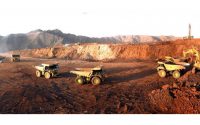Argus- Market participants across Qatar’s ferrous industry are considering their supply options, with established trading patterns and relationships hit by uncertainty after Gulf Co-operation Council (GCC) members Saudi Arabia, the UAE and Bahrain, as well as Egypt, severed diplomatic and commercial ties with Qatar on 5 June.
Qatar’s imports of direct reduction (DR) pellets were hit immediately, leaving steelmakers seeking alternative sources of supply, according to Keyvan Jafari Tehrani, head of international affairs at the Iranian iron ore producers and exporters association (Iropex). “Qatar usually imports 2mn-3mn t/yr of DR pellets from Bahrain Steel, but due to current diplomatic ties they have stopped delivering pellets to Qatar,” he told Argus.
Qatari importers of DR pellets are now likely to turn to mining company Vale, which has production facilities in Oman and Brazil. Oman would be the most viable alternative to Bahraini material, with Vale operating two pellet facilities near Sohar port, Tehrani said, adding that he expects the possibility of Qatar buying pellets from Vale Oman to remain “on the table” even if Bahrain Steel resumed deliveries.
On the steel front, reluctance from UAE buyers to purchase Qatari rebar is opening up selling opportunities for other exporters, including in Turkey, as well as producers in the UAE itself.
That said, Turkish exporters have lately struggled to sell rebar to the UAE, with plentiful supply from domestic mills dominating market share. The domestic rebar price from the UAE’s largest steelmaker, Emirates Steel, stands at AED 1,775/t ($483/t) ex-works this month. A Turkish mill offered July-loading rebar to the UAE at $430/t cfr Duabi on a theoretical weight basis around two weeks ago, but no sale was made.
UK construction firms — developing projects in Qatar for the 2022 World Cup — have expressed concern about being affected by the diplomatic crisis. They are also likely to turn to Turkey for rebar and billet, Tehrani said, citing purchases already made for August delivery.
Other steel-producing countries that might benefit from Qatar’s reduced presence in the export market include Oman, India and Iran. Meanwhile, Qatar is now looking to import cement from Egypt and Oman, instead of Saudi Arabia.
Qatar Steel’s subsidiary FZE continues to operate two facilities in the UAE’s Jebel Ali Free Zone — a 240,000 t/yr wire rod mill and 300,000 t/yr rebar mill. Tehrani says he expects Qatar Steel will have to sell these facilities if the diplomatic dispute is not resolved soon, although the firm itself has not given any indication that it is considering such a move.
FZE mills are already facing difficulties. They have not received any billet — which is supplied through their parent company — since the diplomatic crisis began. Some market participants estimate that the mills have just 2-3 weeks’ worth of billet stockpiled. Once that has been used, they might need to halt operations, or try to secure billet from elsewhere — something that could prove challenging in light of the diplomatic crisis.
Source: Metalprices





